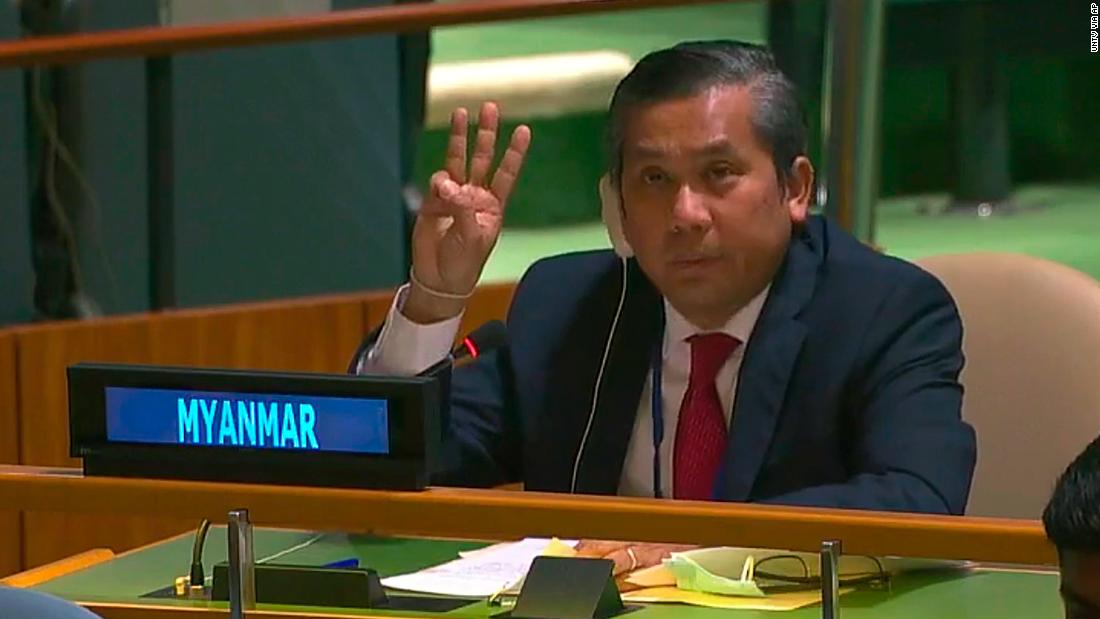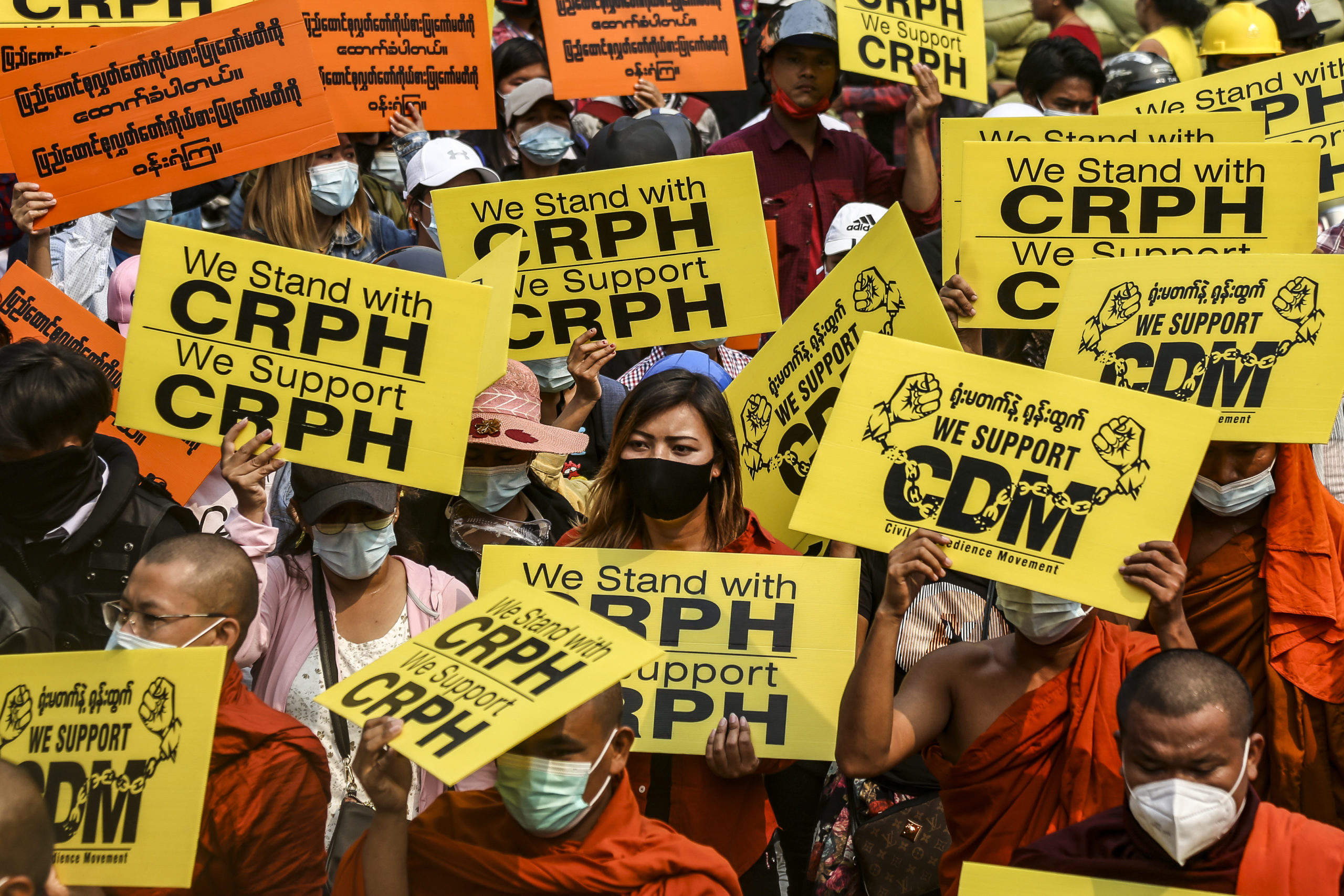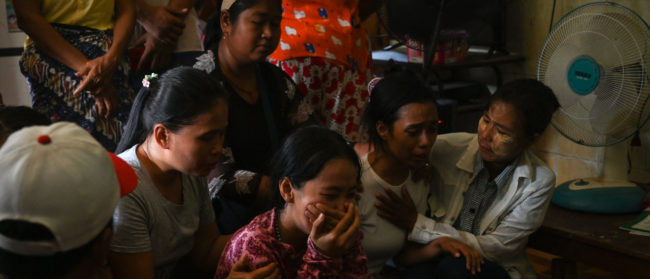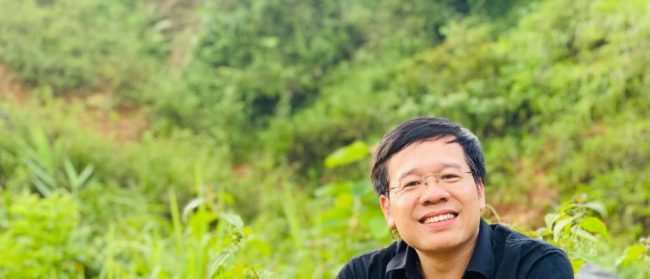Delivering remarks at the UN general assembly on February 26, U Kyaw Moe Tun, Myanmar’s ambassador to the UN, made international headlines when he called on the council to denounce the country’s military.
His voice shaking as he held back tears, the ambassador urged the UN and international community to recognise the Committee Representing the Pyidaungsu Hluttaw (CRPH), a newly-formed provisional body countering the military regime, as the country’s legitimate government.
“The CRPH was formed with members of parliament democratically elected by the people of Myanmar by the recently held free and fair elections,” said Kyaw Moe Tun in his speech, reading a statement written by the committee. “The CRPH is the legitimate and duly elected government of Myanmar and must be recognised by the international community as such.”
Concluding his remarks in Burmese, while briefly holding up the three-finger salute that has become synonymous with anti-military protests in Myanmar and across the region, the ambassador repeated his calls for action. Imploring the UN and international community to use “any means necessary to take action against the Myanmar military”, the ambassador centred these pleas around widespread support and recognition for the CRPH.
Kyaw Moe Tun’s speech signalled the first official mention of Myanmar’s new provisional parliament on the world stage. Seeking recognition as Myanmar’s legitimate government, the CRPH is calling for international involvement in pushing back against the military. And at home, in the absence of senior elected officials within the National League for Democracy (NLD), they have assumed the role of interim government, reflecting many of the calls to action from the anti-coup protest movements.
However, the status of the CRPH’s recognition of legitimacy looks shaky in an international political bloc notorious for turning a blind eye to internal politics, and within Myanmar, a minefield of competing interests and the pressure of overdue ethnic representation poses its own set of obstacles.
When you deal with international governments, it is very important to be recognised as a legitimate government. Otherwise, how can you deal with government-to-government affairs?
Named for Myanmar’s national parliament, known in Burmese as the Pyidaungsu Hluttaw, the CRPH emerged in the aftermath of Myanmar’s military putsch as a representative committee for the NLD majority parliament toppled by the military coup on February 1.
With State Counsellor Aung San Suu Kyi and President Win Myint under military detention, the CRPH was founded soon after the coup as an interim government body to oppose the junta and garner international support and involvement in Myanmar.
Consisting mainly of representatives from the NLD, the CRPH includes a committee of 17 members of the ousted parliament, all elected in the country’s November 8 elections. Representing an additional 380 parliamentarians who have endorsed the committee, the CRPH is set to increase to 30 members in the next week, according to CRPH’s international relations officer Htin Linn Aung.
Htin Linn Aung was not elected in the November 8 elections but as he is based in Washington DC was appointed to represent the CRPH on the international stage. He, along with a four-person cabinet, representing nine ministries, a special envoy to the UN, and a vice president, make up the current leadership of the CRPH.
He said the CRPH has made garnering UN recognition as Myanmar’s legitimate government a top priority in order to achieve international credibility as an official, alternative government to the military regime.
“When you deal with international governments, it is very important to be recognised as a legitimate government. Otherwise, how can you deal with government-to-government affairs?” he told the Globe. “For example, the junta cannot talk to the other countries and the UN officially because they were not elected by the people or through elections.”
However, with the CRPH in its early development stages – still shaping its platform and with only a small number of representatives – recognition and action on the part of the UN is likely far-off.
Yanghee Lee is the former UN Special Rapporteur to Myanmar and one of the founders of the Special Advisory Council on Myanmar, an international platform providing support to civil society and activists within the country. Having represented the UN in her previous mandate, Lee does not believe that recognition will be imminent but believes that the first step for any international body is to officially renounce the military.
“The UN has to not recognise the military junta, that’s the first step. It’s important for the UN Security Council to dispatch or deploy a high level delegation to Myanmar to see and talk to all the stakeholders. And then they can proceed to recognise the CRPH.”

Recognising the CRHP as a legitimate government requires support from the UN Security Council, and Russia and China, two nations on the council with veto power, have historically been opposed to international intervention efforts in Myanmar.
“Russia plays the spoiler role [within the UN]. They just try to make life difficult for all international organisations, plus it has self-interest because it’s a major arms trader with Myanmar and has a long-standing financial relationship with the military,” explained Chris Sidoti, a former member of the 2017 UN Fact-Finding Mission in Myanmar and another founding member of the Special Advisory Council on Myanmar.
And yet, circumstances could be shifting, as China surprised the international community by coming out in support of greater regional stability following the Myanmar coup on February 1. With China’s pivot, Sidoti thinks that Russia could be more inclined to fall in line as well.
“If China does move to a new position of being supportive of non-violent international action, I think Russia would find it hard to play the spoiler role by itself,” Sidoti said.
On March 10, the UN Security Council issued a second statement condemning the use of violence by the Myanmar military. While the word ‘coup’ was omitted, the unanimity of the declaration, including both China and Russia, supports this shift and signals the possibility of greater support for UN-backed measures going forward.
However, even with these promising developments, Sidoti reiterates the views of his fellow Special Advisory Council founder that securing official recognition will take time.
“Right now, the UN is effectively unsure of who is in control in the country, but while the president and state counsellor are detained, the CRPH can claim more legitimacy than anyone else in their absence,” Sidoti said.
Bob Rae, Canada’s Ambassador to the UN and Canada’s special envoy to Myanmar since 2017, has also been in contact with the CRPH and believes that the organisation is the closest body to an elected, representative government in Myanmar today. He notes that while the CRPH is not the government elected in the November 8 polls, its makeup more closely represents the democratic will of the people than the junta.
“We recognise that the CRPH is part of a government that was elected, in many cases they are members of parliament. They are people with extensive political experience and they have more right to claim to be the government of Myanmar than anybody else,” Rae said.
“In any normal democratic political system, they would be the government.”
Achieving international legitimacy has also prompted the CRPH to call on its regional neighbours for support, with the committee also reaching out to partners within ASEAN. Several states have already issued statements of condemnation.
“Singapore’s prime minister has said that there will be no future for [Myanmar] if the military is taking power,” said Htin Linn Aung. “Indonesian and Philippine’s foreign ministers are saying the same. This shows that the international community within ASEAN is not supporting the military at all.”
However, Francis Wade, journalist and author of Myanmar’s Enemy Within: Buddhist Violence and the Making of a Muslim ‘Other’, said that the parallels between Myanmar and other ASEAN member states, as well as the multi-state organisation’s core principle of non-interference, mean that even if ASEAN did intervene in Myanmar, the approach and effects would be limited.
“The issue is that there are several other ASEAN member states currently under the yoke of anti-democratic regimes such that any substantive intervention, beyond vocal condemnation – sanctions, resolutions, and so on – would be hypocritical,” he told the Globe.
While the CRPH works towards achieving international recognition, they have also focused their platform to incorporate grassroots calls for greater international involvement in displacing the military regime, namely the use of R2P.
The R2P principle is a loosely defined political commitment endorsed by all UN member states in 2005, enabling international involvement to prevent mass atrocities if a state is unwilling or unable to help its people. Rae, speaking on behalf of Canada’s mission to the UN, told the Globe he believes that Myanmar qualifies for R2P implementation.
“If there was ever a case where the responsibility to protect makes perfect sense and is in fact required, it’s the seriousness of the situation in Myanmar,” said Rae. “The architecture of the responsibility to protect is to first insist that the government protect its own citizens, and you have a military doing everything it can to destroy the will and confidence of the people.”
These views are similarly reinforced by the CRPH and as well as protesters within the Civil Disobedience Movement (CDM), a decentralised organisation galvanising opposition to the military. However, among demonstrators on the ground, more acutely affected by the immediate ramifications of international involvement, these calls include an added sense of caution.
Thinzar Shunlei Yi, a pro-democracy activist and one of the unofficial leading figures within the CDM movement, supports R2P, but believes diplomatic pressure should be applied before considering boots on the ground.
“We need R2P immediately, but military intervention should be a last resort after all diplomatic efforts have been tried. I know the consequences – the Myanmar military is so aggressive that, if there was external military presence, they would target more civilians in retaliation,” said Shunlei.
On the international stage, the CRPH has echoed these calls for R2P through widespread sanctions. As part of an international, UN-backed framework, these sanctions would be more effective in restricting the military’s power than those imposed independently by governments, explained Sidoti.
“Sanctions under R2P would be much more effective,” Sidoti said. “They would be global rather than bilateral, meaning they would be authorised by the UN and would be binding on all UN member states. They would also preclude states from entering into their own arms deals with Myanmar.”

Domestically, the CRPH, in tandem with the CDM and other local efforts like the General Strike Committee (GSC), are committed to working towards reinstating a democratically-elected government. But despite shared goals, the CRPH has struggled to align themselves with many appeals from the anti-coup grassroots movement on the ground.
Composed of representatives from different political parties, unions, and professions, the GSC’s leading call is for the abolishment of the country’s military-drafted 2008 constitution, which enshrines their stronghold over Myanmar governance.
But Aung Moe Zaw, GSC committee member and chairman of the independent political Democratic Party for New Society, added that the CRPH had initially been reluctant to take a position on abolishing the constitution, making it difficult for the GSC to initially lend its support to the group. But after sustained pressure from the grassroots movement, the would-be government changed its view.
“They [CRPH] issued a statement in which they have made this [abolishing the constitution] one of their key objectives, so we are now better able to work with them,” explained Aung Moe Zaw, who had a warrant for his arrest issued soon after he spoke with the Globe.
There is now a greater recognition of the fact that the failure to embrace federalism, pluralism, and the importance of ethnic identity is something that has to be overcome
The CRPH’s initial hesitation to call for the abolishment of the 2008 constitution is consistent with the cautious policy directives and strategic silences of the previous NLD government, perceived by many as that of appeasement, particularly in their response to the treatment of ethnic minorities across Myanmar.
Rae, Lee and Sidoti, in citing ongoing conversations they’ve had with the CRPH, have all stressed the need for greater diversity and representation of ethnic voices within the provisional CRPH government, widespread inclusion which was lacking in the previous NLD government.
“There is now a greater recognition of the fact that the failure to embrace federalism, pluralism, and the importance of ethnic identity is something that has to be overcome. This has always been a tension inside the country and something that has to be understood as central,” said Rae. “The fact that the forces of democracy so clearly include now a number of leaders of the ethnic areas is significant.”
The destabilising effects of the military putsch and subsequent violence suggests that the CRPH could be making use of this unique moment of ethnic solidarity. As the CRPH builds its unified front, the committee has already included representatives from two ethnic parties, the Kayah State Democratic Party and the Ta’Ang National Party, and more ethnic parties are expected to join in the next weeks.
“The coup has made the ruling [NLD] party vulnerable and has forced the party to talk to different ethnic minority groups so that they can have a stronger coalition against the military,” said Shunlei.
While promising, echoes of past silence on issues of ethnic violence remain. When asked by the Globe about the CRPH’s position on military violence against the Rohingya, spokesman Htin Linn Aung did not wish to comment, citing the sensitivity of the topic.
Other ethnic groups are similarly concerned by the lack of diversity within the CRPH’s current platform. However, with few alternatives and faced with mounting military brutality, grassroots movements like CDM as well as distinct ethnic groups across the country, are cautiously endorsing the CRPH’s legitimacy, but vying for greater inclusion going forward.
“I hear different voices, and so far, ethnic minorities are not yet satisfied with the response,” said Shunlei. “But because the CRPH is the only legitimate body we have, people have no choice but to support them right now.”


